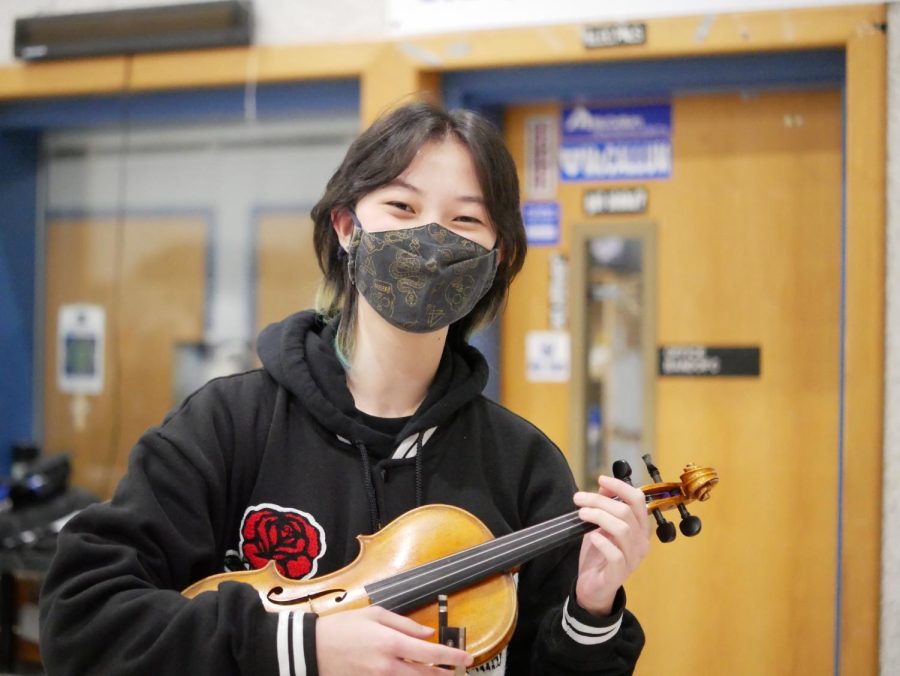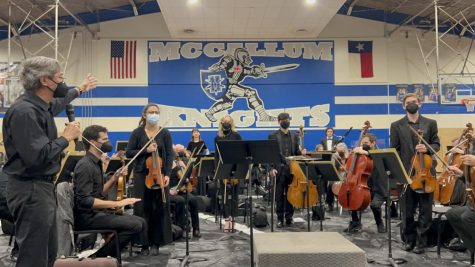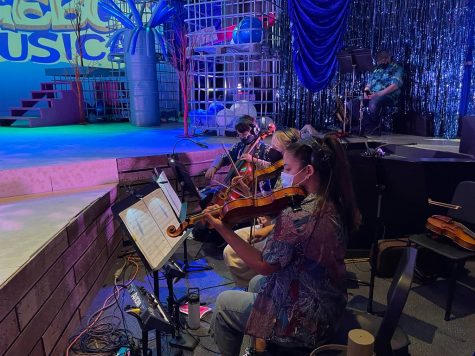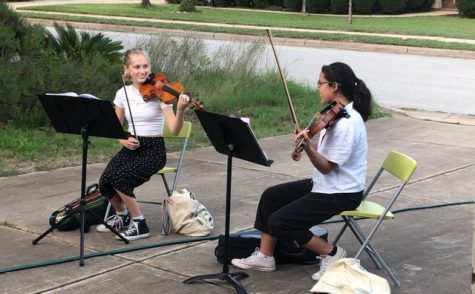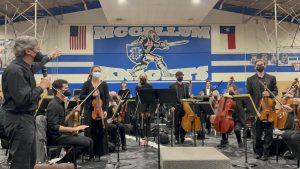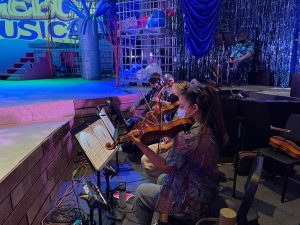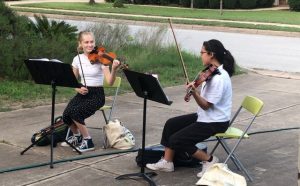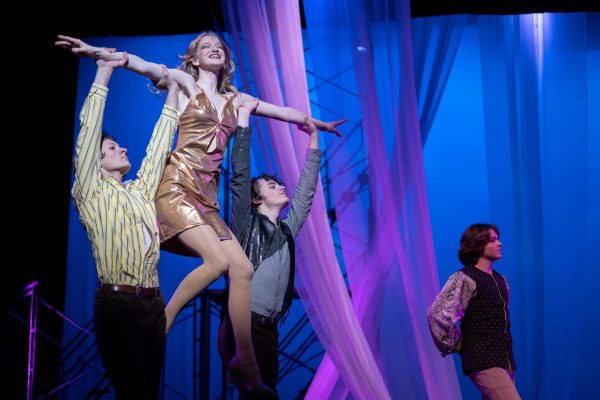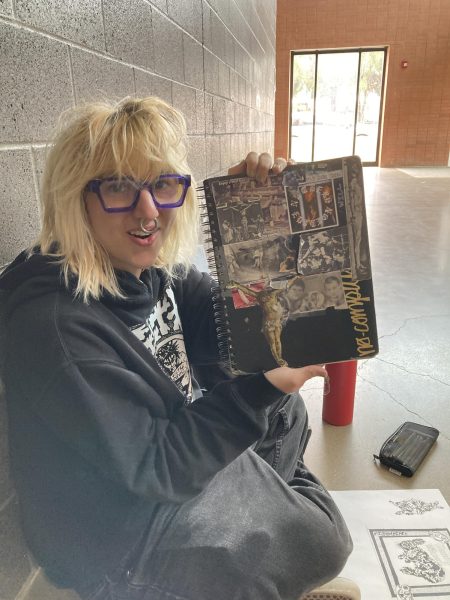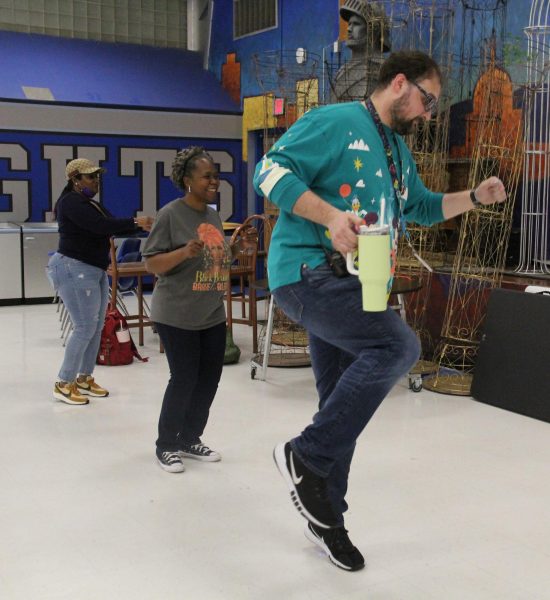Krische finds her forte
All around music lover Thea Krische reflects on all-state orchestra and experience in quartet
Krische poses with her violin before all-state Orchestra. She had qualified the year before, but the performance had been canceled due to COVID. Photo by Lanie Sepehri.
May 5, 2022
Thea Krische is a self-proclaimed music nerd. Despite starting orchestra later than some musicians—in sixth grade—she’s achieved a lot for a junior in high school.
Last semester, she waited anxiously to see if she’d be one of the students to qualify for all-state orchestra.
The process to make it to State started before the school year even began, when students received their region music. Over 70,000 students auditioned in their individual regions, and the highest ranked musicians in each area made it to State. In November, Krische found out she made it into the all-state Sinfonietta Orchestra. She had made it into State the previous year, but this time was different.
I remember that piece finishing and hearing that last note ringing, and I remember thinking, ‘This is for me.’
— junior Thea Krische
“Last year, I got in and then State got canceled,” Krische said. “This year, the audition wasn’t live, so I went into the McCallum theater and recorded it. I found out I had gotten in; I had just barely squeezed into the middle-level orchestra. After that, you get to do a chair test. The first audition tells you what section you’ll be in, the second one tells you what chair you’ll be in that section. I moved up 17 chairs, which was definitely good, so I got to be third chair.”
The next step in the all-state process was traveling to San Antonio to play with students from all over Texas who had also qualified.
“It’s just really cool because everyone there is so good,” Krische said. “I mean, you’re in this orchestra full of amazing people, and they’re all better than you in the best way possible because you’re all working together. It’s not a competition anymore.”
Krische had been waiting for this moment since she qualified last year before it was canceled. She was extra cautious the week leading up to the performance as to not get COVID and have to sit out State yet another year.
The wait proved worth it.
“It’s so much easier to make music at State, because when the director says something, it just happens,” Krische said. “Being around so many people who share your same interests and relate to the stuff you do is really cool.”
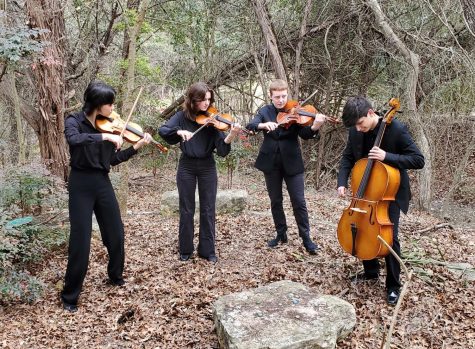
Krische recalls the moment she first realized her love for orchestra during a seventh-grade UIL concert. She sat in the very back of the second violins, only a year into her violin journey. The group played “Dorian Dances,” which became an important step in her musical career.
“I remember that piece finishing and hearing that last note ringing, and I remember thinking, ‘This is for me,’” Krische recalled. “It was just so beautiful hearing the harmonies and stuff. It all came together—I did that.”
For Krische, music offers something unqiue.
“It’s hard to explain why you like something,” Krische said. “It allows me to express myself creatively in ways I don’t get to in school. I’ve never been much of a math and science person. I like creating music. I like hearing everything come together, and it’s very satisfying.”
Krische is involved with her fair share of activities, musical and otherwise. There’s orchestra, of course, and all its accompanying obligations. Piano, to fulfill a fine arts major requirement. In her free time, there’s the guitar and ukulele, among others. She is also in a quartet, run by the Austin Chamber Music Center, or ACMC. She’s in the student council, National Honor Society and is president of the orchestra student council.
She’s also no stranger to other State competitions, being part of the archery team that also qualified for State this year.
Thea is a very inspiring person to be around because she always strives to be the best person she can be
— sophomore Georgia Halverson
Through ACMC, Krische joined a quartet. The quartet was randomly assigned, and although Krische knew most of the people in her quartet, they’ve gotten much closer through this experience.
“We all get along,” Krische said. “What I like about chamber music is it’s just smaller; it’s only four people, so everything you play is heard. You are the only one playing your part, so you have more room to stretch things out and interpret it as you would like, but you’re still doing it with other people.”
The group is composed of Krische, sophomore violonist Georgia Halverson, junior violist Z Campbell and senior cellist Eli Salinas.
Halverson is grateful to work with Krische, citing her hunger to improve.
“Thea is a very inspiring person to be around because she always strives to be the best person she can be,” said Halverson, who met Krische in middle-school orchestra and now comprises one fourth of their quartet.
The group has now been playing together for almost a year.
“There’s just something that’s very satisfying to me about a bunch of people playing together,” Krische said. “You get to hear all your sound mesh, and it’s just more complex that way. With a violin solo, there’s only so much stuff that can go on at once and still be physically possible. With a quartet, there can be so many different color changes, so many different rhythmic patterns going on. It’s just so much more fascinating.”
Krische attributes their close relationship to all the time they spend together.
She is an amazing and passionate violinist, very flexible and adaptable to whoever she plays with resulting in a strong sound and great performance experiences.
— senior Eli Salinas
“Slacking off during rehearsal actually brought us closer as a group,” Krische said. “Just hanging out in the back where all the cellos are, talking about how things are going if we feel too tired to practice—that sort of chemistry really helps in a quartet. To be comfortable sharing your opinions about the piece and being able to know when someone’s going to play and feel where they are.”
The group has several summer gigs lined up, but their remaining time together is limited, as cello player Eli Salinas will go away to college in the fall.
“Playing in a quartet with Thea has been a great experience,” Salinas said. “She is an amazing and passionate violinist, very flexible and adaptable to whoever she plays with resulting in a strong sound and great performance experiences. All in all, Thea has been a great friend who I have been honored to see change and flourish in just the past year. She is one of the few people I know that can do genuinely amazing things to whatever she chooses to put her mind to.”
Krische isn’t exactly sure where her violin journey will lead her.
“A career in music is definitely something that I’m considering,” Krische said. “I’m not dead set on any career right now but I do really enjoy violin. Teaching orchestra at a high school level is something I’m interested in, or just being a performance major and playing around with that. Nothing’s set in stone, but it’s really nice to have that option.”
Her upcoming senior year leads to many decisions and opportunities on colleges and the progression of her quartet, and it is a year that Krische is greatly looking forward to.



